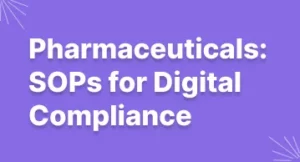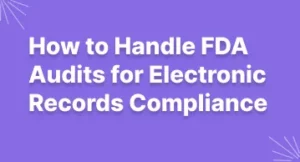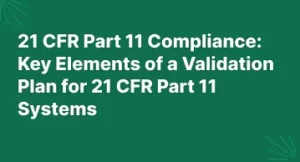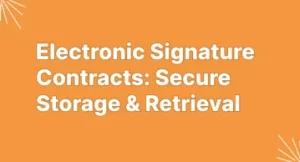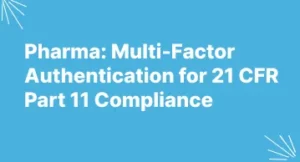21 CFR Part 11 Compliance: Ensuring Data Integrity in FDA-Regulated Industries
Introduction
In today’s digital era, maintaining data integrity is a top priority for FDA-regulated industries, particularly in pharmaceuticals, biotechnology, and medical devices. Regulatory bodies like the FDA and EMA set stringent guidelines to ensure that electronic records and signatures are trustworthy, secure, and tamper-proof. One of the key regulations that organizations must comply with is 21 CFR Part 11 — a federal rule that grants electronic records and signatures the same legal standing as paper-based records.
Failure to comply can result in severe penalties, product recalls, and reputational damage. But how do companies ensure compliance while optimizing their processes? Let’s explore the challenges, best practices, and how MSB Docs can help organizations stay ahead in maintaining data integrity.
Understanding 21 CFR Part 11
21 CFR Part 11 is a regulation issued by the U.S. Food and Drug Administration (FDA) that defines the criteria under which electronic records and electronic signatures are considered trustworthy, reliable, and equivalent to paper records. It ensures that digital documents used in regulated industries meet the same standards of authenticity, integrity, and confidentiality as their paper-based counterparts.
Key Components of 21 CFR Part 11
- Electronic Records: Organizations must ensure that digital records are accurate, reliable, and protected against unauthorized changes.
- Audit Trails: Systems must maintain secure, time-stamped logs of all record modifications.
- Electronic Signatures: E-signatures must be uniquely linked to individuals and protected against tampering.
- Validation: Companies must validate electronic systems to ensure accuracy, reliability, and consistent performance.
The Importance of Data Integrity in FDA-Regulated Industries
Data integrity is the foundation of compliance and patient safety. Without it, companies risk producing inaccurate results, which can compromise public health. Regulatory agencies take enforcement action against companies that fail to ensure the authenticity, accuracy, and reliability of their data.
Consequences of Poor Data Integrity
- Regulatory Fines: Non-compliance can result in hefty fines and warning letters from regulatory authorities.
- Product Recalls: A lack of reliable data can lead to defective products being released to the market, causing recalls.
- Loss of Trust: Patients and healthcare providers lose trust in a company’s products if they fail to meet regulatory standards.
ECompanies must take a proactive approach to ensure compliance by implementing best practices and leveraging the right technology solutions.
Challenges in Maintaining Data Integrity
Despite the clear importance of data integrity, many companies struggle to implement a robust compliance strategy. Some common challenges include:
Manual Processes and Paper-Based Systems
- Paper records are prone to errors, misplacement, and tampering.
- They require significant storage space and management efforts.
Lack of Secure Electronic Systems
- Many companies use outdated or non-compliant software.
- Without encryption and authentication controls, records can be easily altered.
Inconsistent Training and Awareness
- Employees may not be fully aware of compliance requirements.
- Human errors often lead to data integrity violations.
Inefficient Audit Trails
- Some systems lack proper tracking and monitoring capabilities.
- Without an audit trail, detecting unauthorized changes becomes difficult.
Challenges with Informed Consent & Medical Consent Forms
- Capturing informed consent electronically while ensuring compliance can be complex.
- Medical consent forms need to be securely stored and retrievable for audits.
Companies must address these issues with a combination of technology, policies, and training programs.
Best Practices for Ensuring Data Integrity
To ensure compliance with 21 CFR Part 11, companies must implement industry best practices. Here are some key steps:
Adopt a Compliant Electronic Signature Solution
- Implement an FDA-compliant e-signature system that adheres to 21 CFR Part 11.
- Ensure signatures are encrypted, traceable, and uniquely attributable.
Implement Strong Authentication & Access Controls
- Use multi-factor authentication (MFA) to prevent unauthorized access.
- Restrict system privileges through role-based access.
Ensure Complete Audit Trails
- Maintain an immutable, time-stamped audit trail for all record modifications.
- Conduct regular audits to monitor compliance.
Regular Validation and System Testing
- Validate systems to confirm they meet regulatory requirements.
- Perform periodic security and compliance assessments.
Digitize Informed Consent and Medical Consent Forms
- Ensure that medical consent forms are stored securely with version control.
- Implement tamper-proof electronic consent systems for patient documentation.
By following these best practices, organizations can ensure regulatory compliance, data security, and operational efficiency.
How MSB Docs Helps Ensure 21 CFR Part 11 Compliance
MSB Docs offers a validated digital solution that enables organizations to achieve 21 CFR Part 11 Compliance effortlessly. Here’s how:
Adopt a Compliant Electronic Signature Solution
- Compliant Electronic Signatures: MSB Docs ensures that e-signatures meet the regulatory standards with multi-factor authentication, encryption, and audit trails.
- Secure & Tamper-Proof Records: All documents are stored in a secure digital repository with controlled access and integrity safeguards.
- Comprehensive Audit Trails: Every modification is time-stamped, ensuring complete traceability.
- Streamlined Informed Consent Management: Digital workflows make it easy to collect and track medical consent forms.
- Validation & Compliance Support: MSB Docs is designed to support system validation processes, helping organizations to easily meet FDA expectations.
By leveraging MSB Docs, companies can eliminate the risks associated with manual processes, ensuring seamless compliance with industry regulations.
Conclusion
In an era where data integrity is non-negotiable, FDA-regulated industries must prioritize compliance with 21 CFR Part 11. Ensuring that electronic records, informed consent, and medical consent forms are securely managed is critical for avoiding regulatory penalties and maintaining public trust.
Adopting MSB Docs as your compliance partner ensures that your organization is always prepared for regulatory audits while improving operational efficiency.
Want to learn more? Check out our previous blog on Top 7 Reasons Regulated Industries Trust MSB Docs for 21 CFR Part 11 Compliance.
Stay compliant. Stay ahead.
